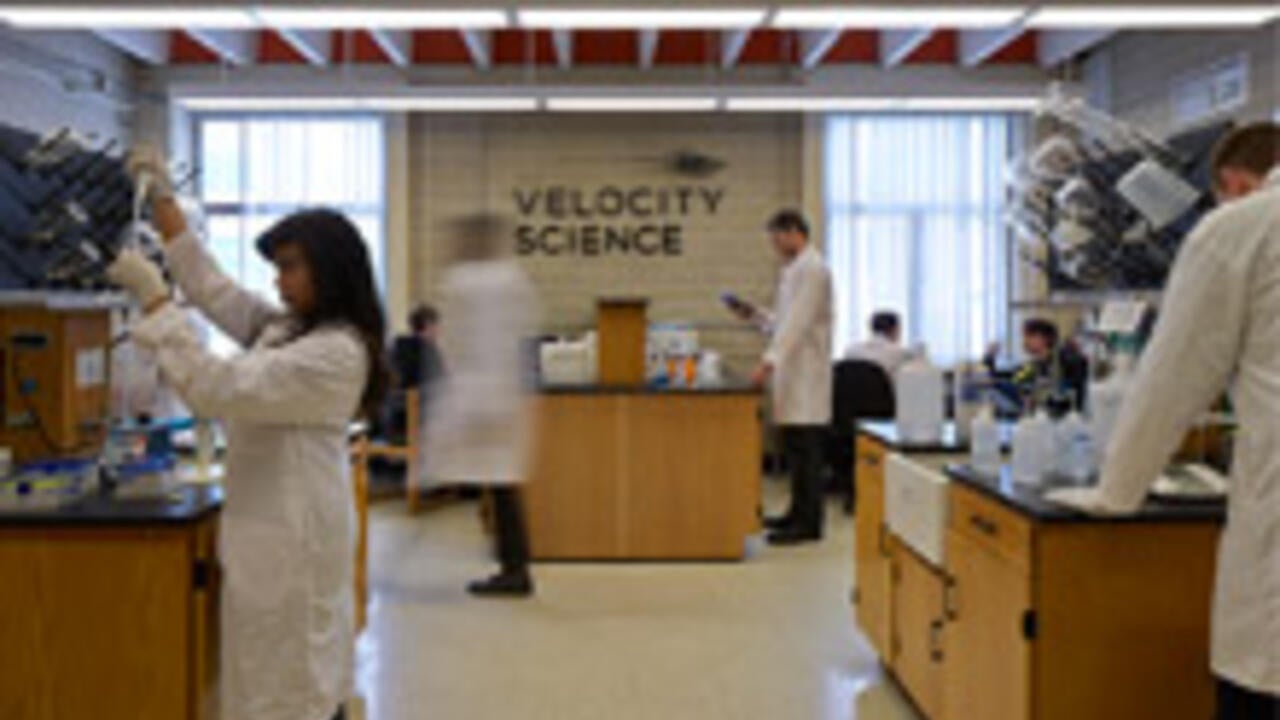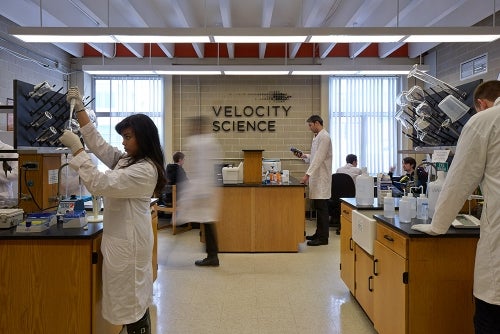
Velocity Science expands and Velocity Start program launches
Velocity Science has grown from a student-initiated group of entrepreneurs to an internationally-recognized community of successful startups

Velocity Science has grown from a student-initiated group of entrepreneurs to an internationally-recognized community of successful startups
By Jude Fiorillo Velocity
The University of Waterloo’s Velocity startup program is expanding its on-campus entrepreneurship programs by tripling lab space for Velocity Science and launching a new program called Velocity Start.
Velocity Science, a partnership between the Faculty of Science and Velocity, is a discovery space for startups where world-renowned scientists mentor Waterloo entrepreneurs creating startups in the life and physical sciences. Its on-campus lab will grow to more than 2,600 square feet when it opens in February, with plans to move into a 7,000-square-foot home in the Faculty of Science’s new state-of-the art Science Complex upon completion of construction.
“This expansion of Velocity Science is indicative of the tremendous success and growth it has experienced in the three years since its inception," said Feridun Hamdullahpur, president and vice-chancellor of Waterloo. "The University of Waterloo is the academic engine of a remarkable innovation cluster and an anchor in Canada’s emerging innovation corridor that stretches from Waterloo to Toronto. Expanding programs like Velocity will help us unlock the talent at Waterloo to further enhance the innovation process and generate additional economic impact across Ontario.”
Velocity Science teams have already been recognized, some internationally:
Velocity is also opening the doors to Velocity Start this week, a new 6,000-square-foot space at the University of Waterloo. The new program is for people who want to learn about entrepreneurship and develop the skills, networks, and mentors to grow a business. It also welcomes people from any background, regardless of interest in entrepreneurship, who simply want a great place to work.
Velocity Start is located on the second floor of South Campus Hall, and in addition to lounge and workspace, it offers a 650-square-foot maker space with 3D printers, hand tools, startup coaching, weekly workshops and panel discussions.
“Velocity Start is the entry point for any students who want to explore entrepreneurship, " said Mike Kirkup, director of Velocity. "We want to equip prospective entrepreneurs with the mentorship, tools, and collaborative environment needed to develop their ideas, in order to inspire and support the next wave of world-class startups out of Waterloo."
In November, Velocity announced it will expand its Velocity Garage startup incubator in downtown Kitchener by more than 29,000 square feet to provide space for up to 120 startups to work and collaborate.
This expansion will include a wet lab for science startups to commercialize research, a dedicated workshop for assembling hardware prototypes, and expanded facilities for startup mentorship. Many of the companies in this expanded facility have emerged from the Velocity Science program.
As part of the University of Waterloo’s commitment to innovation, Velocity does not charge companies or students fees to participate and it does not take any equity from startups. More than 160 companies have emerged from the program since its inception in 2008, raising in excess of $250 million in venture capital, and creating over 800 jobs. This places Velocity and the University at the heart of the Waterloo regional innovation ecosystem, providing the foundation for the region’s economic growth and job creation.
In addition to the Velocity Garage at the Lang Tannery in Kitchener, Velocity programming includes a residence for entrepreneurs on Waterloo’s main campus, and a pitch competition that awards $375,000 in non-equity grants a year.

Read more
Here are the people and events behind some of this year’s most compelling Waterloo stories

Read more
From co-op to startup: Waterloo students develop an AI platform that uses real-time data for wildfire prediction and early prevention

Read more
More than 20 founders from Waterloo highlight the newly unveiled list that celebrates those making the biggest impact inside Canadian tech and innovation
The University of Waterloo acknowledges that much of our work takes place on the traditional territory of the Neutral, Anishinaabeg, and Haudenosaunee peoples. Our main campus is situated on the Haldimand Tract, the land granted to the Six Nations that includes six miles on each side of the Grand River. Our active work toward reconciliation takes place across our campuses through research, learning, teaching, and community building, and is co-ordinated within the Office of Indigenous Relations.